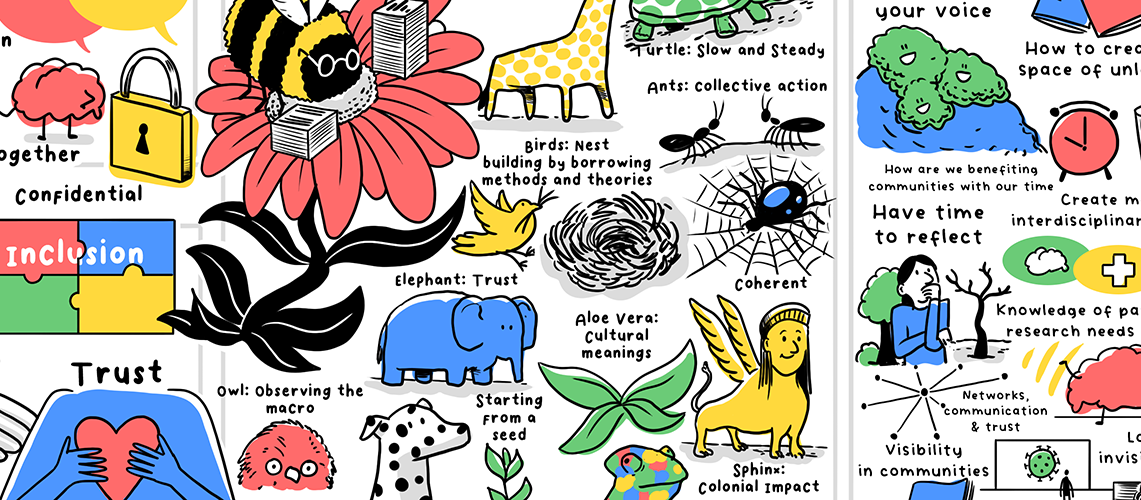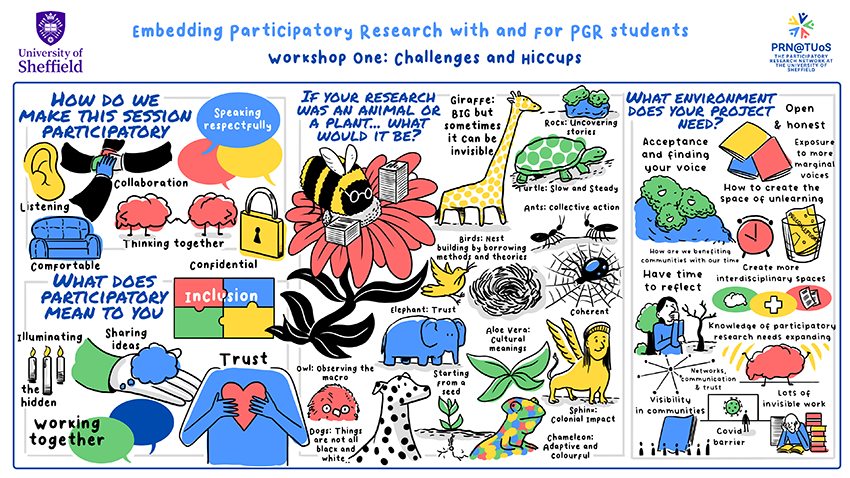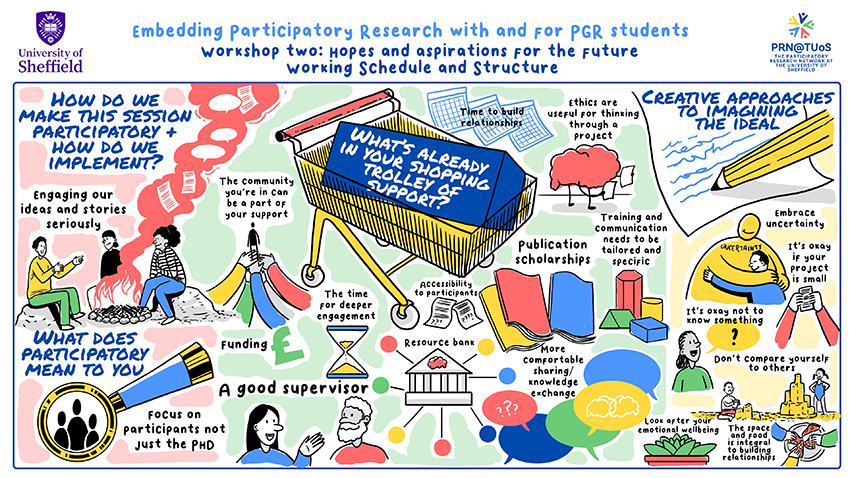 Artwork created as part of research exploring explore the hiccups in the journeys of participatory research faced by postgraduate researchers. Artwork by Liam Callebout
Artwork created as part of research exploring explore the hiccups in the journeys of participatory research faced by postgraduate researchers. Artwork by Liam CalleboutAs active members of the Participatory Research Network at the University of Sheffield, we are keenly aware of the challenges faced by postgraduate researchers (PGRs) striving to embark on more participatory ways of doing research. To tackle this, we recently undertook a series of creative and participatory workshops in close collaboration with postgraduate researchers who all, in diverse ways, had some affiliation to participatory modes of inquiry.
In this blog post, we look to achieve two things. First, we wish to reflect upon the value of creative and participatory methodologies. And second, we shine a light on what is needed to support PGRs embarking on their own participatory research journeys.
Our creative and participatory methodologies push back against the survey and focus-group fatigue faced by many students in higher education. We believe that creative methods enable critical reflections into the everyday institutional processes and practices faced by doctoral researchers. Creative methods can offer a disruptive and affirmative route to capture the hopes, desire and calls to action with and for PGRs.
The challenges faced by postgraduate researchers
Participatory research strives to be an ethical, collaborative and community-engaged form of inquiry. Participatory research values collaboration in knowledge generation, recognises different kinds of insider, lived and embodied experience and is often a meaningful and politicised tool for change.
Creativity and creative methods mean to ‘produce’ through an active involvement and process of working together. They are often tied up with participatory action research, community-based, feminist, queer, activist, crip and decolonising methodologies, and their intersections. However, participatory research often comes into conflict with postgraduate study and the individualised doctoral process. For example, obtaining a PhD often is an individual submission, shaped by a specific time limit and (for some, but not all) a small pot of funding. Such policy processes are not conducive to collaborative endeavours of knowledge generation.
How we explored the issue
To explore the hopes, aspirations and challenges in PGRs' doctoral research, we ran three participatory workshops with 20 PGRs, led by Ankita Misha as a fellow PGR. We used various creative activities to foster these conversations in our workshops. We ran a creative methods zoo to help us explore the hiccups in the journeys of participatory research faced by PGRs (Artwork by Liam Callebout).

We also co-imagined a shopping trolley to understand the existing forms of support to which PGRs had access, and we co-wrote a letter to prospective PGRs embodying the hopes and aspirations of PGRs (Artwork by Liam Callebout).

Finally, we undertook a collaborative analysis which centred on how universities can support participatory research for PGRs and how this feeds into broader commitments for inclusive research cultures. We used the metaphor of building a bridge to make connections between the current context and the ideal aspirations to support PGRs in embedding participatory research in their doctoral journeys. Aspirations included more time to develop and sustain research relationships and collaborations, funding to support this work, a commitment to diverse communication and dissemination formats, and crucially, a network and support system that supports doctoral researchers on this journey.
Animations
As part of the project, we created some animations. Given the collaborative and community efforts that symbolise participatory research, we show the findings and suggestions for the future in both animations via the metaphor of a community allotment. This works to demonstrate community, collaboration and nurturing our environments for growth.
The first animation works towards finding ways of enabling participatory research with and for PGRs, including those who are starting out their research journey with an interest or a commitment to participatory approaches. The animation explores matters such as community, time and resources.
Our second animation documents the ways in which those in research leadership, management and/or research administration positions can support PGRs in implementing participatory research. The animation covers key areas such as supervisory support, community networks and financial support. This animation takes a ‘looking up’ approach to those in positions of leadership that can positively influence research cultures with PGRs’ commitment to participatory research in mind.
Creating a manifesto for supporting postgraduate researchers
Our call to action to address the concerns raised resulted in a co-authored manifesto which highlights roles and responsibilities for different institutional actors to support PGRs’ participatory research journeys and cultivate more inclusive research ecosystems in the university. We further reflected on these via a short podcast series co-created with PGRs.
Our hope, then, is to bring our co-produced manifesto to life to ensure better conditions for participatory research at doctoral level and thus, positively impact inclusive research cultures and doctoral journeys.
Thank you to our brilliant PGRs who made this project possible, and to Research England for the funding to undertake this work. We’d also like to thank Hannah Raine and Bryony Vince for their initial framing of this project, to Liam Callebout for Graphic illustrations and to Kitty Turner for our PGR podcast productions.
To find out more about the University of Sheffield Participatory Research Network, please visit our website. To find out more about PGRs experiences and the detailed findings of this project, please visit the resources page.

